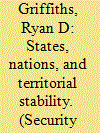|
|
|
Sort Order |
|
|
|
Items / Page
|
|
|
|
|
|
|
| Srl | Item |
| 1 |
ID:
140355


|
|
|
|
|
| Summary/Abstract |
Common wisdom and current scholarship hold that governments need to stand firm in the face of secessionist demands, since permitting the secession of one region can set a precedent for others. For this reason governments will often choose blood rather than risk dissolution. I argue that administrative organization provides states with a third option. Those regions that represent a unique administrative type stand a much better chance of seceding peacefully. Moreover, large articulated states sometimes downsize by administrative category, which helps explain why governments will release one set of units without contest while preventing another set from doing the same. Finally, secessionist movements that do not cohere with any administrative region are the least likely to be granted independence. In sum, the administrative architecture of states provides governments with a means to discriminate between secessionist demands. I test this theory in a large-N study using original data on secessionist movements and administrative units between 1816 and 2011.
|
|
|
|
|
|
|
|
|
|
|
|
|
|
|
|
| 2 |
ID:
155492


|
|
|
|
|
| Summary/Abstract |
Mindful of the growing interest in non-Western and pre-modern political systems, we propose a framework for the analysis of states, state systems, and international orders. We provide a culturally neutral definition of the state and outline a method for assessing variation in political organization both within and above the state. Our framework cleanly delineates hierarchy from anarchy and can be applied to a diverse set of state systems. We then show how the content of international order inter-relates with system structure and the local density (interaction capacity) of a region. We argue that our framework captures similarities—and exposes differences—between different systems and orders over time and space. It strikes a balance between the traditional focus on the Western experience and the current trend toward regional studies in which it is difficult to accumulate knowledge in a rigorous manner.
|
|
|
|
|
|
|
|
|
|
|
|
|
|
|
|
| 3 |
ID:
130930


|
|
|
|
|
| Publication |
2014.
|
| Summary/Abstract |
We argue that system-level international changes have made secessionism more attractive since 1945, and that this is one of the reasons for the recent Proliferation of Aspiring States. Using original data on secessionist movements between 1816 and 2011, we document that secessionism became significantly more common after 1945. Whereas much of the existing literature explains secessionism by pointing to local or unit-level factors, we contend that security, economic, and normative changes at the international level have effectively increased the benefits of independence, without a commensurate increase in the costs. We use interviews with representatives of new states, secessionist groups, and international organizations to provide empirical support for these claims. We conclude by considering three extensions of our argument: (i) Does the nature of the changing international environment affect the way in which secessionists attempt to achieve their goals? (ii) What future changes might amplify or depress this trend? (iii) Who are the specific people benefiting from statehood, and can their position within a would-be state help us understand the nature of secessionism today?
|
|
|
|
|
|
|
|
|
|
|
|
|
|
|
|
| 4 |
ID:
147911


|
|
|
|
|
| Summary/Abstract |
How would a hegemonic China shape international norms related to states, nations, and territoriality? Scholars have noted the conflict between the right of minority nations to self-determine and the right of states to maintain their territorial integrity. An unrestricted application of the former would risk considerable state fragmentation; an unconditional acceptance of the latter would condemn stateless nations to a subordinate status. Powerful actors like the United States have attempted to navigate these norms by specifying the conditions under which one norm should take precedence over the other, but such decisions are difficult to make in an international environment that lacks consensus, and the result is an ambiguous international order where conflict is common. I analyze the future of these norms in a Chinese-led international order, explaining why China would champion territorial integrity over self-determination, and why this would be better for territorial stability.
|
|
|
|
|
|
|
|
|
|
|
|
|
|
|
|
|
|
|
|
|